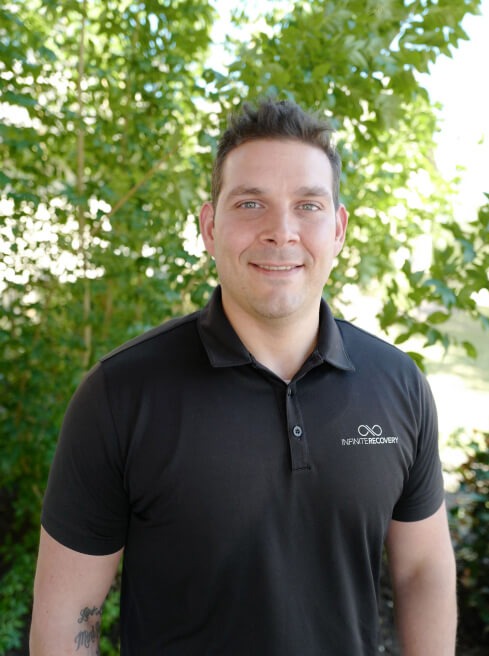DBT Therapy in Austin, TX for Substance Use Disorders
As part of our holistic approach to addiction treatment, Infinite Recovery provides dialectical behavior therapy (DBT) in Austin for clients in our inpatient and outpatient programs.
DBT is a type of psychotherapy that has been shown to be particularly helpful for those with borderline personality disorder, substance abuse disorders, eating disorders, and other mental health disorders. [1] It is one of many treatment approaches used by our skilled clinicians and may be combined with cognitive behavioral therapy, motivational interviewing, art therapy, and other modalities.

What is Dialectical Behavior Therapy (DBT)?
Dialectical behavior therapy is a type of talk therapy that aims to strike a balance between accepting oneself and the current situation with the desire to change and become healthier. [1] Other types of talk therapy that solely focus on identifying problematic behavior and developing new skills may not be as effective for individuals who are suicidal or have intense emotions.
Dialectical behavior therapy not only supports the development of healthy habits and thought patterns, it also encourages self-compassion, helping clients feel validated and understood as they navigate their emotional landscapes.
Because dialectical behavior therapy was developed as a treatment for borderline personality disorder and suicidal ideation, it focuses heavily on harm prevention and the creation of a life worth living. [2] It can be incorporated into an individual therapy session or in a group therapy setting.
Some of the emotional and psychological conditions that our DBT Austin program can be used to address are:
- Anxiety
- Bipolar disorder
- Borderline personality disorder
- Depression
- Eating disorders
- Inability to manage emotions
- Mood disorders
- Personality disorders
- Self-harming behaviors
- Underdeveloped coping skills

How Residential & Inpatient DBT Programs Support Addiction Recovery
Many individuals with a substance use disorder have a co-occurring mental health disorder.
Often the abuse of substances can make mental health issues worse. In other cases, mental health symptoms may be masked by substances and only apparent once an individual becomes sober. In either case, it’s essential to address mental and emotional health during addiction treatment. This way, individuals can identify the underlying causes of their addictive behavior and heal holistically.
True recovery is about more than getting sober. It involves facing the past, healing physically, mentally, and emotionally, and creating a life that is meaningful, purposeful, and fulfilling. DBT can be an important part of this process.
It allows individuals to accept themselves and their emotions so that they can release negative thoughts and move forward. When clients work with a DBT therapist, they can learn tools for emotion regulation, distress tolerance, and controlling impulsive behaviors, which aids in maintaining sobriety.
While each person’s own experience and motivation for working with a DBT therapist can differ, some of the common goals of DBT therapy can include:
- Lower levels of anxiety or depression
- Increased ability to regulate and manage emotions
- Better interpersonal effectiveness and communication skills
- Healthier relationships Processing of traumas and triggers
- Opportunity to learn skills that aid in relapse prevention
To learn more about Infinite Recovery’s DBT rehab in the Austin area, reach out to our admissions team today. We would be happy to answer any questions you may have about our residential DBT programs and our trauma-informed care.
What to Expect During a DBT Therapy Session
The first step of the process for dialectical behavior therapy is sitting down with a licensed professional counselor or licensed clinical social worker and discussing your challenges and goals. After reviewing your case and learning about your treatment goals, your therapist can determine whether DBT is a good fit for you and your situation.
Your therapist may determine that the dialectical behavioral therapy approach on its own will be most successful or may choose to couple this modality with other therapeutic approaches, such as cognitive behavioral therapy or eye movement desensitization.
Each DBT session typically focuses on an event from the previous week that triggered intense emotions. This could be a social interaction, a challenge related to work or employment.It could also be a negative thought pattern that led to symptoms of depression, anxiety, anger outbursts, or suicidal ideation. For individuals with substance abuse disorders, the triggering event could include a craving or attempt to return to their drug of choice.
Your therapist or licensed clinical social worker will not only validate your experience, but they’ll also help you analyze your behavior in the situation. Together, you can determine what was helpful and what wasn’t. This collaborative approach empowers you to accept your experiences and make positive life changes, avoiding cycles of negative thoughts and self-harm in the future.
In addition, a trained DBT therapist or licensed professional counselor can help clients manage emotions and learn skills to improve their mindsets and relationships. These include emotion regulation, mindfulness, interpersonal effectiveness, and distress tolerance. [2]
During individual and group sessions, the DBT therapist will check in with clients about these four skills and the progress being made. They may also make themselves available in between sessions to assist clients, particularly those with a history of self-harm behaviors or suicidal ideation.
At Infinite Recovery, we get it – every journey to mental well-being is one of a kind. And when it comes to DBT, we believe in giving you choices that suit your specific needs. Whether you’re all about structure or prefer flexibility on your healing journey, we’ve got the perfect path for you. You can choose between DBT outpatient therapy or inpatient options.
About Our Therapeutic Services
Infinite Recovery offers comprehensive clinical services through our inpatient and outpatient addiction treatment programs. We partner with Austin mental health professionals to provide our clients with high-quality, evidence-based mental health support.
Each person in our program works one-on-one with a therapist throughout treatment. They also attend group therapy sessions and meetings. The therapist works closely with the client’s case manager and recovery support specialist and remains with the client through each level of care we provide. Following treatment, clients are welcome to continue with their therapist as they transition into their new, sober lives.
While our clinical services are based heavily on the 12 Steps to Recovery, we offer a full range of traditional and innovative treatment modalities so that we can best meet the unique needs of individual clients.
In addition to art therapy services, we also offer:


Individualized Treatment from a Caring Team
By offering a range of treatment services and modalities, we help people struggling with substance abuse address the underlying causes of their addiction, including mental health disorders such as anxiety and depression. Our mental health professionals are trained in a wide range of techniques, including dialectical behavior therapy, so they can best meet the needs of each client.

Get the Support You Need With Our DBT Therapy Austin Program
If you or a loved one are seeking an Austin DBT therapist or addiction services that focus on mental health and holistic healing, reach out to the team at Infinite Recovery today. Our trauma-informed, evidence-based programs not only help individuals get sober, but to develop the healthy coping skills and sense of purpose necessary for building a life worth living.
Each client in our program works individually with a therapist, case manager, and recovery support specialist. They all collaborate to design a personalized master treatment plan that includes the medical, intellectual, emotional, and spiritual aspects of recovery. Our Austin therapists are trained in DBT and other approaches to help people struggling with addiction.
Ready to break free from addiction and reclaim your life? We offer a range of treatment options, from inpatient medical detox to outpatient programs and residential rehab, to guide you every step of the way. No matter where you are in your recovery journey, we’re here to support you.
Finding the right treatment shouldn’t be a financial burden. All of our levels of care are covered in-network by most major insurance providers, making recovery accessible and affordable.
Contact our admissions team today to verify your insurance, discuss your options, and embark on a journey to a healthier, happier future.